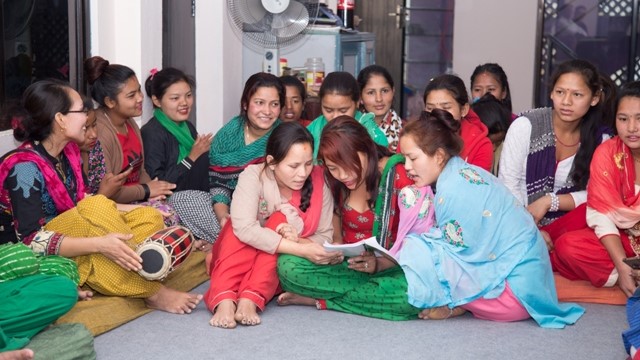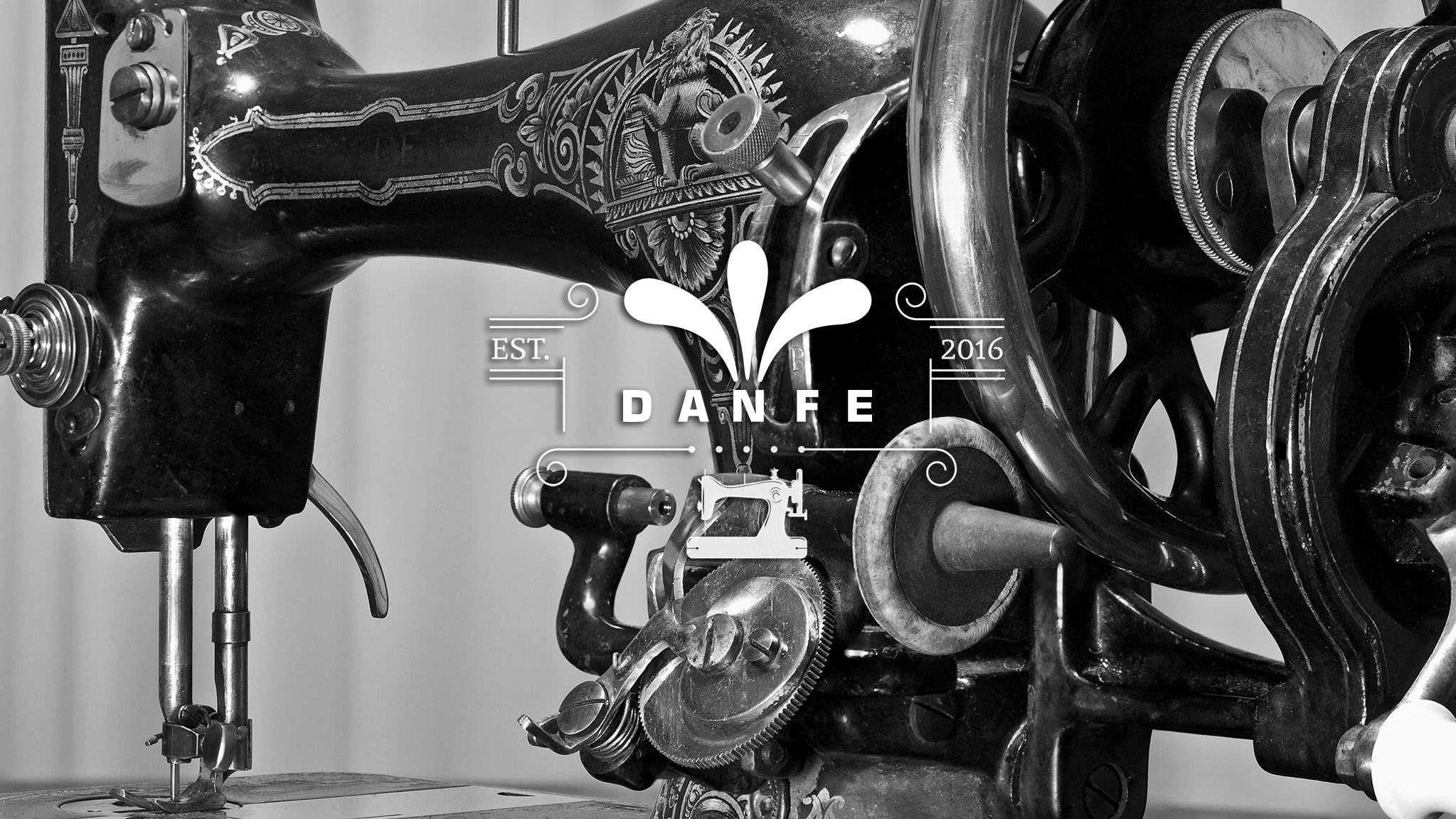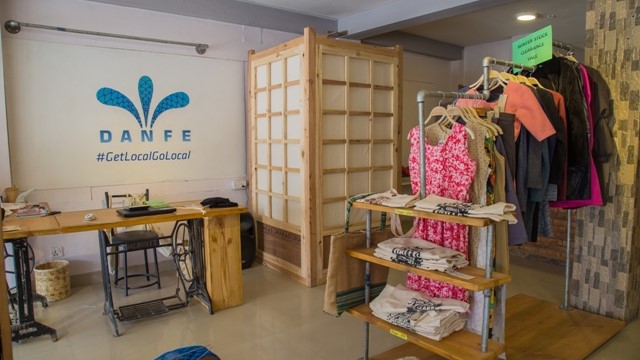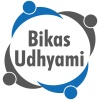SOCIAL ENTREPRENEURSHIP BLOG SERIES ISSUE NO. 7: Danfe - Tailoring Life
In the aftermath of the earthquake in 2015, many organizations were established to help victims. However, Danfe did something different, by finding a sustainable way of supporting earthquake victims focusing on disadvantaged women and girls aged 18-25.
Kritishma Karki, Executive Director, and Bijeysh Ranjit, Director of Development and Administration, sat down with Bikas Udhyami and shared the story behind the establishment of Danfe and how they are empowering women to become self-employed.
What is Danfe?
Danfe is a social enterprise working for the empowerment and development of girls in earthquake affected areas. It basically trains disadvantaged girls aged between 18 to 25 to establish a tailoring business. When they are fully trained, they start a business and the products made are sold through the Danfe outlet and different e-commerce sites.
How did the initiative start?
We had an organization called Saath, a social organization working with marginalized communities established in 2006. and Danfe was the livelihood project for earthquake affected young girls. The main motto of Danfe was to help earthquake victims in 2015 by supporting them in reconstruction. After working for a few months, we realized that while the work was going well, we were not able to find any long term solution or impact of our work. Thus, while thinking about long term solutions, we sat together in a group and discussed what could be done to achieve long term impact. Through that discussion, we came up with an idea and started our tailoring project with earthquake victims.
As a pilot project, we brought 5 girls from earthquake affected areas and gave them tailoring training for 6 months. At first, we did not work like a social business, but while searching for a sustainable way to make a difference and impact in society we came up with this idea.
After 6 months, the project started to create positive impact. The difference in the lives of these girls was remarkable. Along with the work, they learned different life skills including working as a team, and increasing their self-confidence.
At the end of 2015, Caritas Canada, approached us, saw the pilot project and liked it. So with their support, we brought together more than 30 girls from Sindhupalchowk, Makwanpur and Kavre and gave the same tailoring training to them. We chose these districts because they are earthquake affected areas and because they are most prone to trafficking in persons .
How do you choose the beneficiaries ?
We basically select beneficiaries from 18 to 25 years of age .We are focusing on these girls, because at this age they are in high risk of being subjected to trafficking, sexual harassment, violence and so on. We are increasing the awareness of the girls of these risks as well as coping strategies while empowering them to make an independent living.
We coordinate and partner with local organizations. First, we conduct a need assessment which includes what type of skills do they need , what type of girls can really benefit from our project and so on. After that we then set criteria to choose the girls . Some of the criteria are: Age , the girls who are willing for the positive change on their own,Economic Status of the family and other relevant criteria as per the situation. The girls that meet the criteria, are brought to Kathmandu. Until now, we have been able to empower 54 girls.
There are several other organizations providing tailoring training. How are you different from them ?
For many girls, it is the first time that they visit Kathmandu and it is a big change for them coming from a rural setting to an urban setting. We try to create a comfortable environment for them and make them feel at ease. Hence, we provide lodging for them at a girls’ hostel so that they don’t have to worry about accommodation and food and can fully focus on training only.
As we are from social work background, we wanted to support the girls in their overall development too. So we provide them with drama and informal classes, counseling, recreation and other workshops. In addition, we also equip them with knowledge on different social issues like gender equality, gender-based violence, dowry etc. Furthermore, we also provide separate weekly education classes for the girls. As most of the girls are school dropouts and for tailoring basic mathematics is essential, we provide them with mathematics classes and other basic education classes. Finally, we also conduct recreational activities, like outings and picnics functions. All these additional activities, have helped the girls a lot. We find that combining the tailoring training with such additional models and education provides a holistic model for their overall development. Thus, since the early establishment of Danfe in 2015, we are still continuing our work in the same way.


What sustainable business model does Danfe use?
In next 5 years Danfe envisions to establish itself as an independent enterprise. So while searching for the model of sustainability, we came up with the idea for a store. Our plan was to start selling the products through the store and then start marketing of our products and selling them through ecommerce sites. As per our target, the store was opened on December 23, 2016. After our first tailoring training was completed, out of 30 girls, 24 returned to their home and 6 stayed behind to work for our store so we were able to create a job opportunity for them. At present we have one store in Lalitpur and we sell our products through ecommerce sites like Thread Paints, Sasto Deal, etc.
The store is helping to sustain the project. We don’t spend the money generated from the store, but we put the money in a Danfe Endowment Fund. This allows us to use these funds in future for further training and development of other beneficiaries.
What are the positive changes in lives of the girls?
Changing a person’s life is an ambitious goal. At Danfe, we don’t say we can change the lives of the girls, but we are able to create a positive impact on their lives. After our training and workshops, they learn many new things, but it is up to them whether they want to implement the things they have learned or not. We cannot force them.
We can only show them the way and provide a platform for them. We try our best in supporting them. We believe self-realization is very important. Before Danfe, many of the girls believed that they could not lead their life independently. After the training, they feel that they are now independent and can make a living on their own. Their level of confidence has increased and our trainings and workshops have helped them to face the challenges of real world.
What were the major challenges you faced in Danfe’s journey?
As we did not have a business background, we faced many challenges. However, in a way, not having much business knowledge, it made us more resourceful in finding opportunities. When you don’t have any ideas, you are more willing to try out new things. While we experimented with new things, there were of course other challenges related to pricing, production and gaining trust from customers.
There were marketing challenges too. In Nepal, the idea of buying a product made in Nepal is still very new. When people think of a “Made in Nepal” product, they usually only think of handicrafts and locally made products, which are sold to tourists and foreigners. There are many enterprises that sell “Made in Nepal” products, but we still have a long way to go in terms of attracting Nepali customers.
Similarly, an initial challenge was to train the girls, as they did not have basic idea of tailoring and this took time. Even selecting girls from village areas was challenging. People were not convinced to send their daughters with us, but with the involvement of local organizations we were able to gain their trust.
We are taking these challenges in a positive way. We are in learning process. To sum it up, the whole system and process is challenging. Starting from scratch is always a challenge but very rewarding at the same time.
How is the reaction from the families of the girls you work with?
Firstly, there was a trust issue. Some parents came to see the hostel, the lodging, food and so on. They visited from time to time to see their daughter. However, after the training was over and the girls returned to their homes, they appreciated the project. And they were happy to see their daughters being able to sustain themselves.
Out of 54 girls enrolled till date, 7 started their own tailoring enterprise, 6 are receiving on the job training on Danfe, 16 are working for other enterprise, there are 6 home based workers and 19 are on training currently.
What are your future plans?
We have many future plans, but to be specific we are planning to increase our outlets and making these self-sustaining in future. In addition, we also want to create a home based working system in our organization like a network of people working from home like a chain. Creating awareness on "Made in Nepal" products. We also have a plan to create a specific niche for our products in the market and we want our customers to come for the quality of products rather than to support the cause. Furthermore, we are Kathmandu based training centre till now, but we are planning to create community based training centres in the various districts where we work. We want to see NGOs sustaining themselves, rather than being donor dependent and Danfe has started the initiation of this process.
What are your comments and suggestions for young people who want to start a social business?
Start with your idea immediately. Unless you start doing things you cannot achieve anything. Things will grow continuously. There are challenges, but you have to mitigate and overcome all these challenges along the way.
At the same time, you should be very clear about your intentions. You must think first of the issue you want to address and how you want to address it. You should also have long term goal, since when you add “social” to your work this comes with a responsibility. If somebody is benefiting from your work, you cannot quit like some many other regular enterprises do in Nepal.
For more information visit : http://saath.org.np/danfe/
Facebook : fb.com/danfeworks
Instagram : https://www.instagram.com/danfeworks/
Phone :016200083
Hasapota Ganesh, Jhamsikhel, Lalitpur

